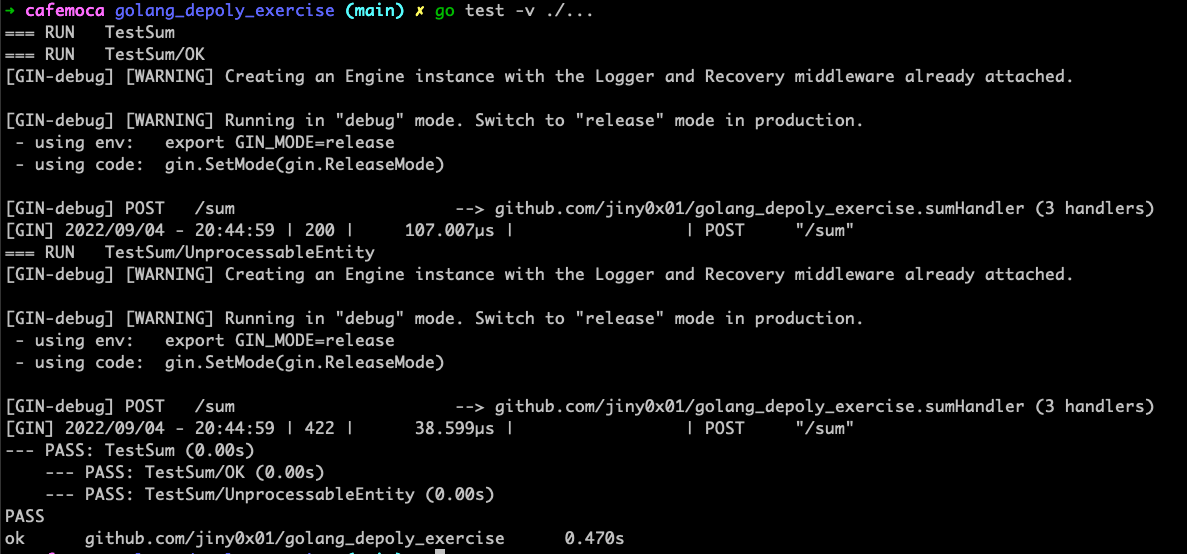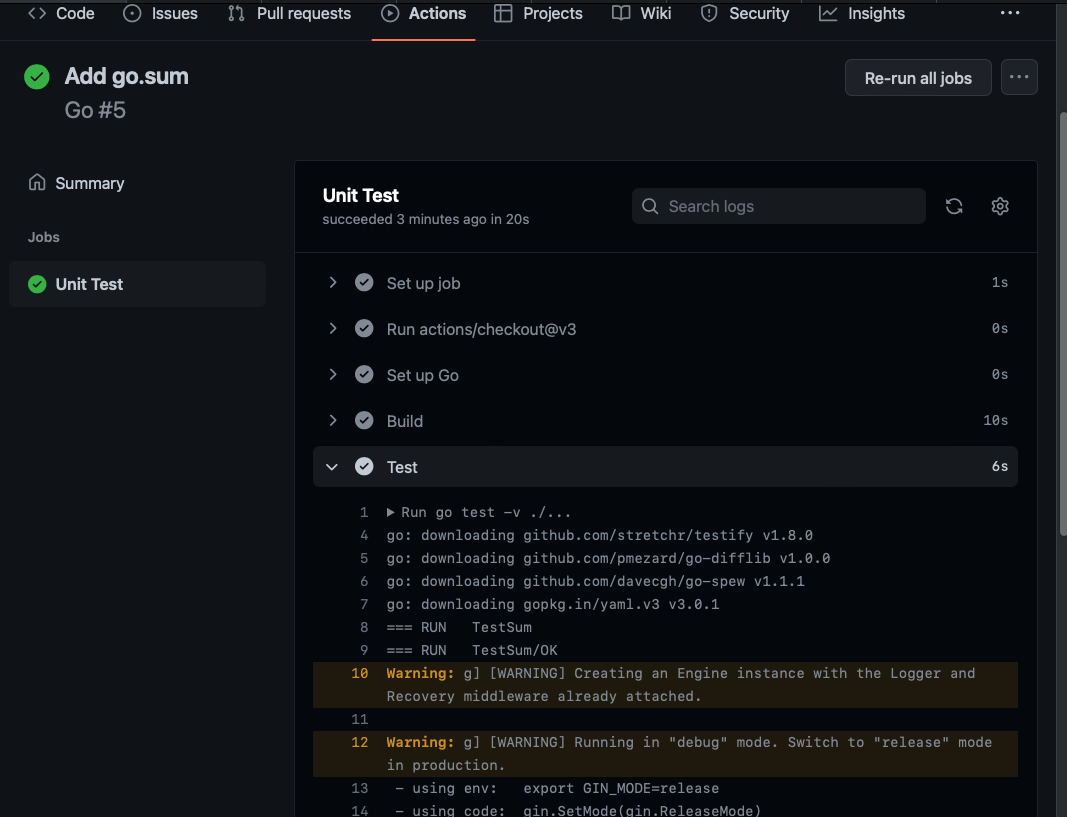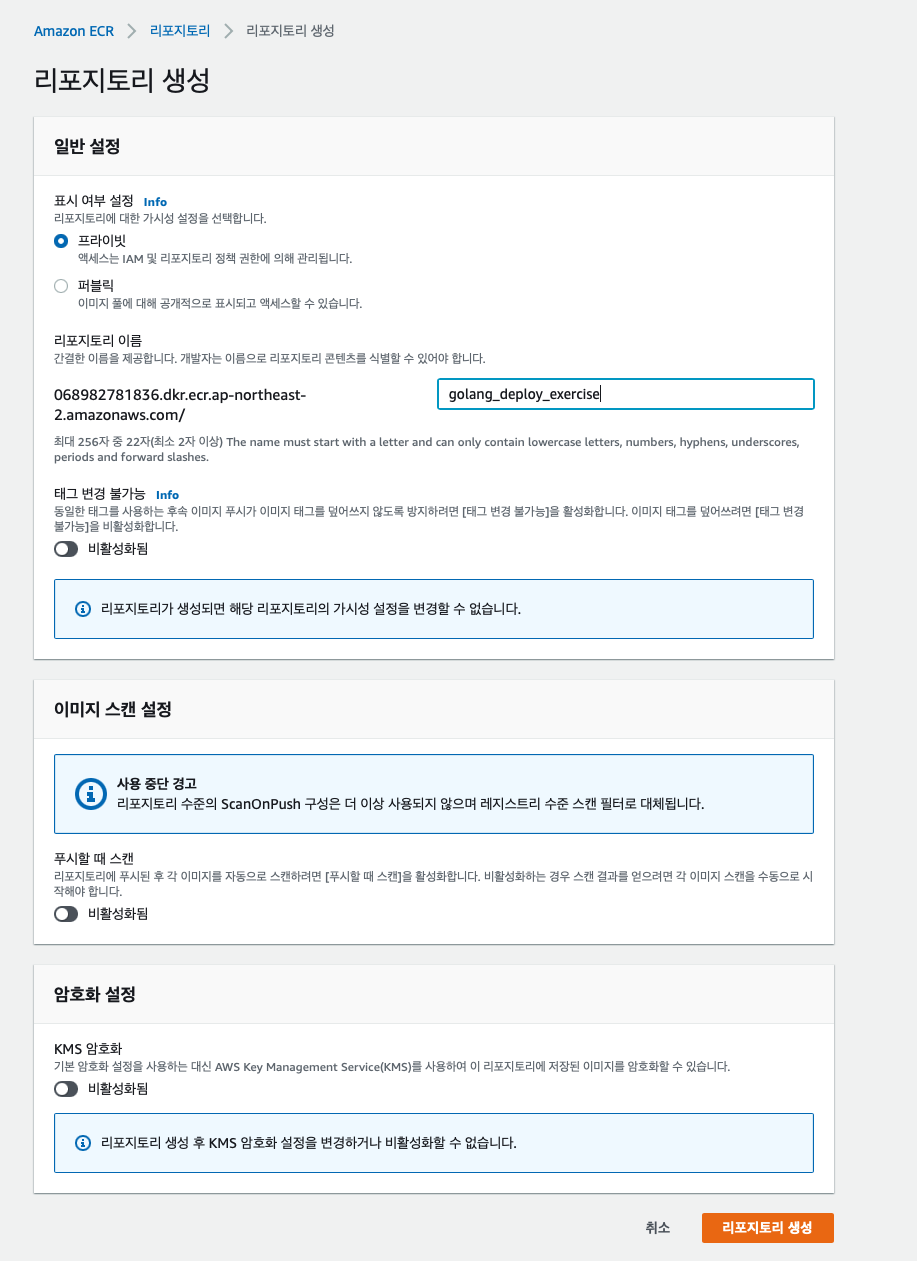golang_depoly_exercise
웹서버를 만들고 이를 github-action ci로 unit-test를 진행할 것이다. 이후에 AWS ECR에 올리는 과정까지 알아보자.
이 저장소는 https://youtube.com/playlist?list=PLy_6D98if3ULEtXtNSY_2qN21VCKgoQAE 에 나온 내용을 공부하여 일부를 정리한 것이다.
Golang github action
간단한 테스트용 웹서버 만들기
데모 프로젝트 저장소는 여기서 확인하면 된다. https://github.com/jiny0x01/golang_depoly_exercise
프로젝트 디렉토리를 생성하고 초기화 해준다.
mkdir golang_deploy_exercise
cd golang_deploy_exercise; go mod init golang_deploy_exercise; go mod tidy
웹서버에 쓸 gin과 unit test에 사용할 testify를 추가한다.
gin
go get -u github.com/gin-gonic/gin
testify
go get github.com/stretchr/testify
// main.go
package main
import (
"net/http"
"github.com/gin-gonic/gin"
)
type sumRequest struct {
A int `json:"a" binding:"required"`
B int `json:"b" binding:"required"`
}
func sum(a, b int) int {
return a + b
}
func sumHandler(c *gin.Context) {
var req sumRequest
if err := c.ShouldBindJSON(&req); err != nil {
c.JSON(http.StatusUnprocessableEntity, gin.H{
"error": err.Error(),
})
return
}
result := sum(req.A, req.B)
c.JSON(http.StatusOK, gin.H{
"result": result,
})
}
func main() {
r := gin.Default()
r.GET("/ping", func(c *gin.Context) {
c.JSON(http.StatusOK, gin.H{
"message": "pong",
})
})
r.POST("/sum", sumHandler)
r.Run()
}//main_test.go
package main
import (
"bytes"
"encoding/json"
"net/http"
"net/http/httptest"
"testing"
"github.com/gin-gonic/gin"
"github.com/stretchr/testify/require"
)
func TestSum(t *testing.T) {
testCases := []struct {
name string
body gin.H
checkResponse func(t *testing.T, recorder *httptest.ResponseRecorder)
}{
{
name: "OK",
body: gin.H{
"a": 10,
"b": 20,
},
checkResponse: func(t *testing.T, recorder *httptest.ResponseRecorder) {
require.Equal(t, http.StatusOK, recorder.Code)
},
},
{
name: "UnprocessableEntity",
body: gin.H{
"a": 10,
"c": 50,
},
checkResponse: func(t *testing.T, recorder *httptest.ResponseRecorder) {
require.Equal(t, http.StatusUnprocessableEntity, recorder.Code)
},
},
}
for i := range testCases {
tc := testCases[i]
t.Run(tc.name, func(t *testing.T) {
router := gin.Default()
router.POST("/sum", sumHandler)
recorder := httptest.NewRecorder()
data, err := json.Marshal(tc.body)
require.NoError(t, err)
url := "/sum"
request, err := http.NewRequest(http.MethodPost, url, bytes.NewReader(data))
require.NoError(t, err)
router.ServeHTTP(recorder, request)
tc.checkResponse(t, recorder)
})
}
}/sum에 POST 요청으로 a와 b를 보내면 a+b를 반환해주는 간단한 웹서버다. 아래 명령어로 전체 테스트를 진행할 수 있다.
go test -v ./...
이제 github repo에서 actions 탭에서 Go 템플릿을 살짝 수정할거다.

# .github/workflows/test.yml
name: Run unit test
on:
push:
branches: [ "main" ]
pull_request:
branches: [ "main" ]
jobs:
test:
name: Test
runs-on: ubuntu-latest
steps:
- uses: actions/checkout@v3
- name: Set up Go
uses: actions/setup-go@v3
with:
go-version: 1.18
- name: Test
run: go test -v ./... # ./...는 현재 디렉토리 아래에 있는 모든 것을 의미모든 파일들을 다 추가하고 push하면 된다.
```bash
git add .
git commit m -m "Add unit test"
git push
workflow
workflow에는 job이 존재하며 한 job에는 여러 step이 있다. 각각의 job은 병렬로 동작하거나 순서에 맞춰 동작할 수 있다. 하나의 job은 여러개의 step을 갖고 있을 수 있다.
step
각각의 step에는 1개 이상의 action이 존재한다. github action에서 알고 넘어가야할 부분은 job과 step이다.
앞서 본 unit test는 단순히 ubuntu 환경에서 golang을 set-up하고 go test를 실행한 것이 전부다. 추가적인 작업이 필요하다면 name을 정해주고 어떤 명령을 수행할지 run에서 정의해주면 된다.
- name: build
run: go build -vaction에 대해 더 깊게 이해하고 싶다면 아래 공식문서의 설명을 읽어보자 https://docs.github.com/en/actions/learn-github-actions/understanding-github-actions#the-components-of-github-actions
ECR Build
위에서 만든 서버 애플리케이션을 ECR(Elastic Container Registry)에 배포 해볼 것이다.
Dockerfile & docker-compose 작성
우선 Dockerfile을 작성해준다.
#Dockerfile
#Build stage
FROM golang:1.18.5-alpine3.16 AS builder
WORKDIR /app COPY . .
RUN go build -o main main.go
# Run stage
FROM alpine:3.16
WORKDIR /app COPY --from=builder /app/main .
EXPOSE 8080
CMD [ "/app/main" ]FROM을 2개 쓰는 이유가 궁금하면 여기로
- (multi stage build)[https://cafemocamoca.tistory.com/320]
docker-compose를 사용하여 서버 애플리케이션을 실행할 것이다.
# docker-compose.yml
version: "3.9"
services:
app:
build:
context: .
dockerfile: Dockerfile
ports:
- "8080:8080"
command: [ "/app/main" ]아래 명령어를 실행하면 잘 작동하는 것을 확인할 수 있다.
docker-compose up
AWS ECR
aws에 로그인하고 ECR을 검색한 후 private으로 repo를 생성한다.
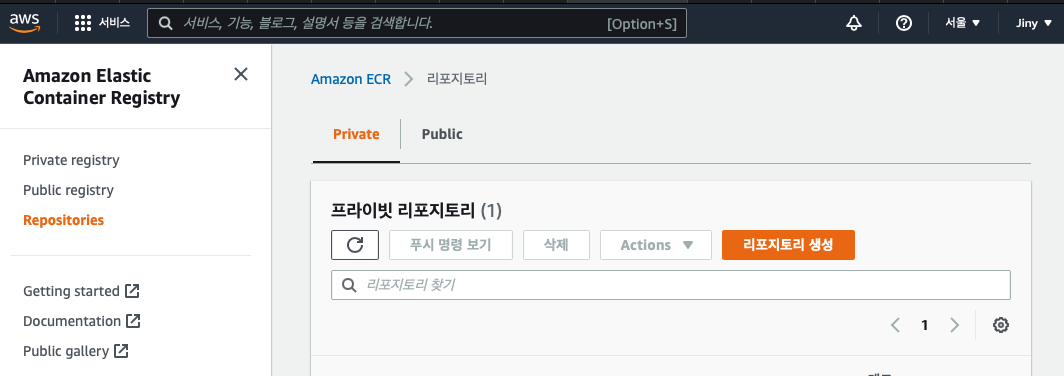
repository가 생성되면 상단에 푸쉬 명령 보기 팝업이 뜬다.
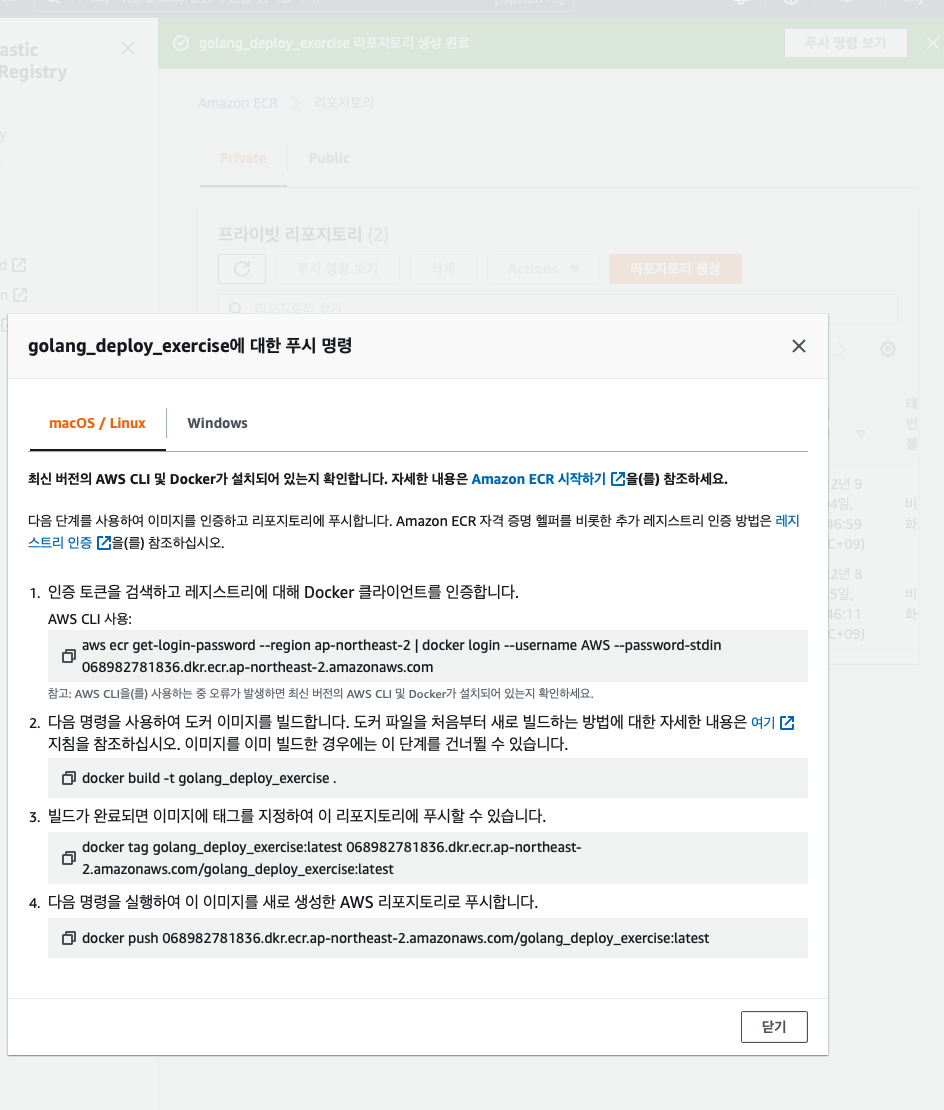
아까 작성한 docker-compose를 ecr에 올리기 위해 workflow를 하나 더 만들어준다. 작성 방법은 아래 링크를 참조하여 작성한다. 우리의 repository가 private 점을 기억하자.
# .github/workflows/deploy.yml
name: Deploy to production
on:
push:
branches: [ main ]
jobs:
build:
name: Build image
runs-on: ubuntu-latest
steps:
- name: Check out code
uses: actions/checkout@v3
- name: Configure AWS credentials
uses: aws-actions/configure-aws-credentials@v1
with:
aws-access-key-id: ${{ secrets.AWS_ACCESS_KEY_ID }} # github>repo에서 추가
aws-secret-access-key: ${{ secrets.AWS_SECRET_ACCESS_KEY }} # 위와 동일
aws-region: ap-northeast-2 # 리전을 서울로 설정해주자
- name: Login to Amazon ECR
id: login-ecr
uses: aws-actions/amazon-ecr-login@v1
- name: Build, tag, and push docker image to Amazon ECR
env:
REGISTRY: ${{ steps.login-ecr.outputs.registry }}
REPOSITORY: golang_deploy_exercise # ecr 레포 이름
IMAGE_TAG: ${{ github.sha }}
run: |
docker build -t $REGISTRY/$REPOSITORY:$IMAGE_TAG .
docker push $REGISTRY/$REPOSITORY:$IMAGE_TAGaction이 aws에 접근할 수 있게 설정 해야한다.
AWS IAM(Identity and Access Manager)에서 사용자를 추가해준다.

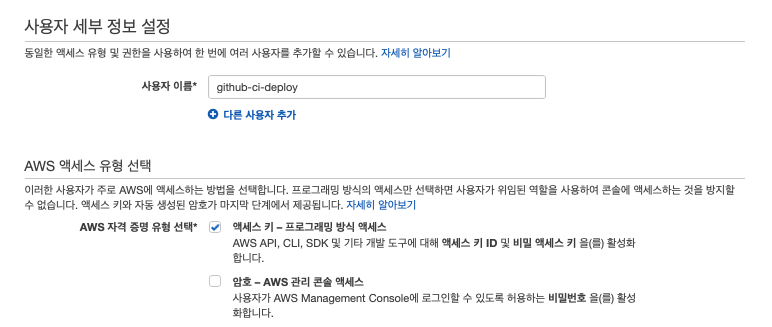
사용자를 그룹에 추가하기 위해 우선 그룹을 먼저 만든다.
그룹의 권한은 ECR에 접근할 수 있도록 EC2ContainerRegistryFullAccess를 적용해주고 다음으로 넘어간다.
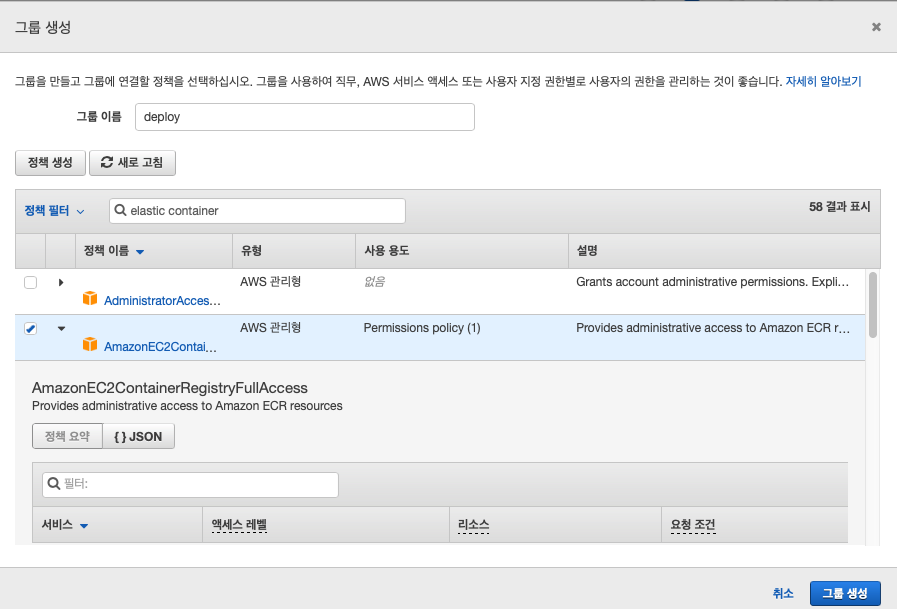
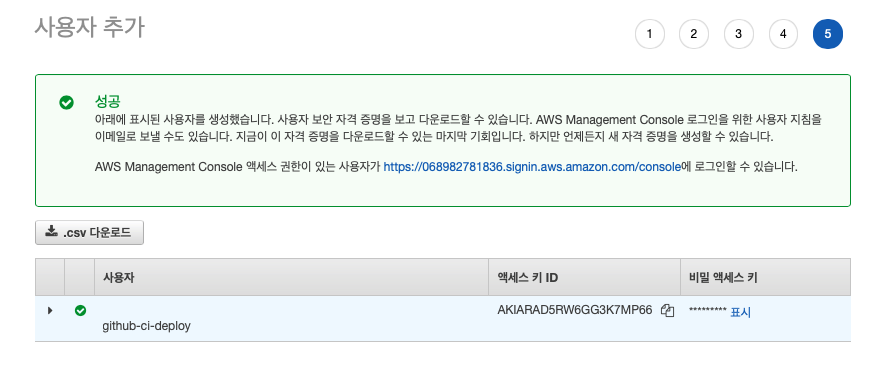 생성된 Access Key ID와 Secret Access ID를 github 저장소에 설정하면 action이 이를 바탕으로 deploy.yml에 값을 적용할 수 있다.
생성된 Access Key ID와 Secret Access ID를 github 저장소에 설정하면 action이 이를 바탕으로 deploy.yml에 값을 적용할 수 있다.
아까 deploy.yml에서 credentials 쪽을 보면 secrets.AWS_ACCESS_KEY_ID와 secrets.AWS_SECRET_ACCESS_KEY가 보인다.
- name: Configure AWS credentials
uses: aws-actions/configure-aws-credentials@v1
with:
aws-access-key-id: ${{ secrets.AWS_ACCESS_KEY_ID }}
aws-secret-access-key: ${{ secrets.AWS_SECRET_ACCESS_KEY }}
aws-region: ap-northeast-2 # 리전을 서울로 설정해주자
repository > settings > Actions에서 access key와 secret key를 이름을 맞춰서 추가해준다.
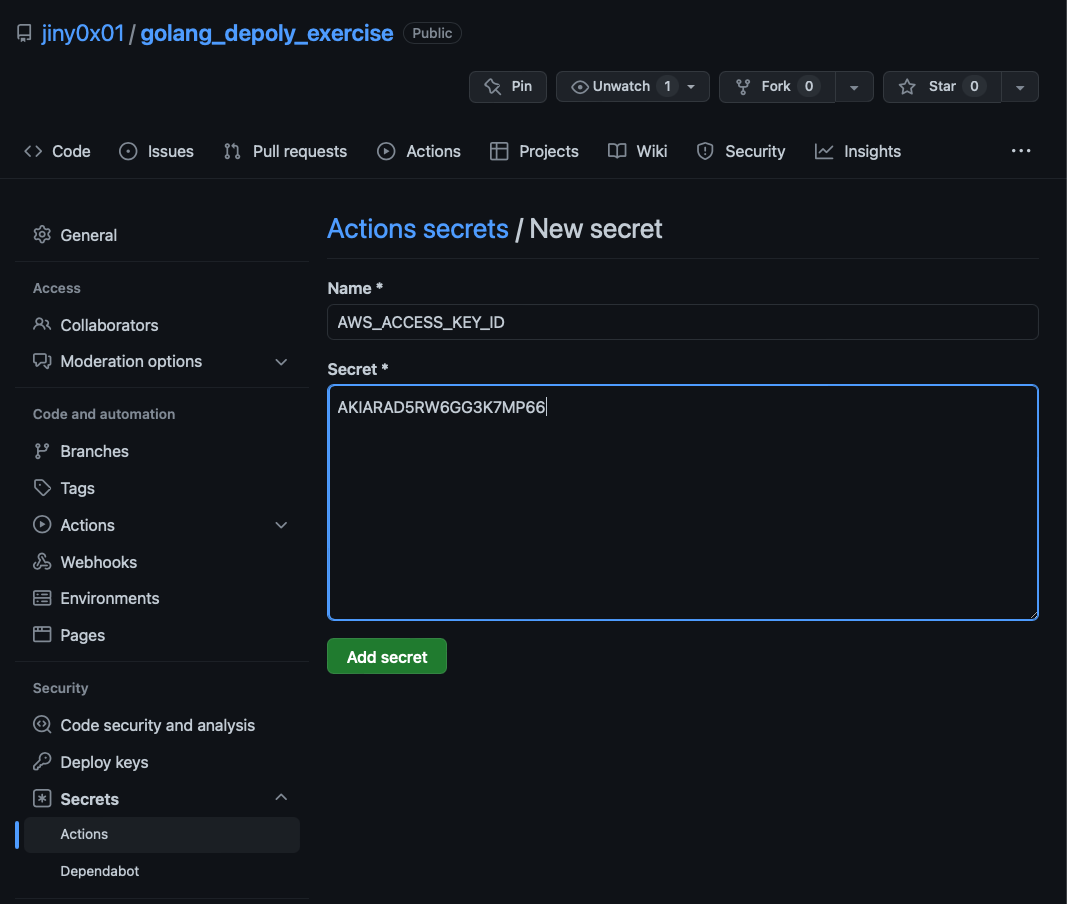
여기까지 진행하고 파일들을 add-commit-push하면 ECR에 잘 올라간 모습을 볼 수 있다.
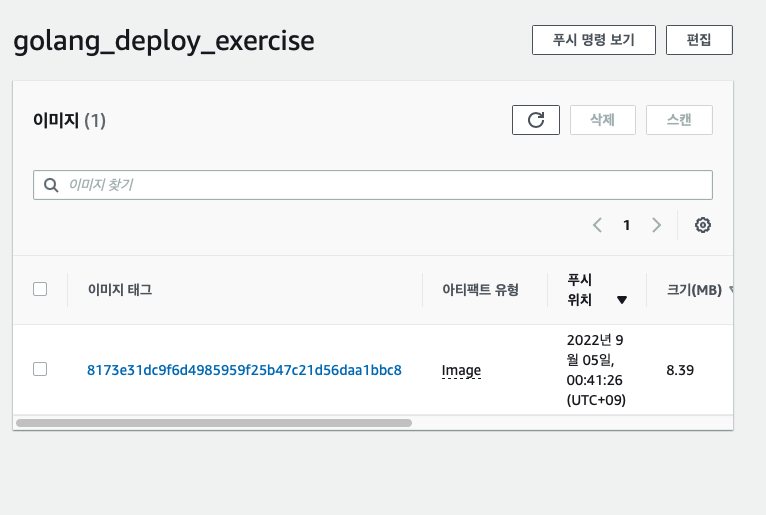
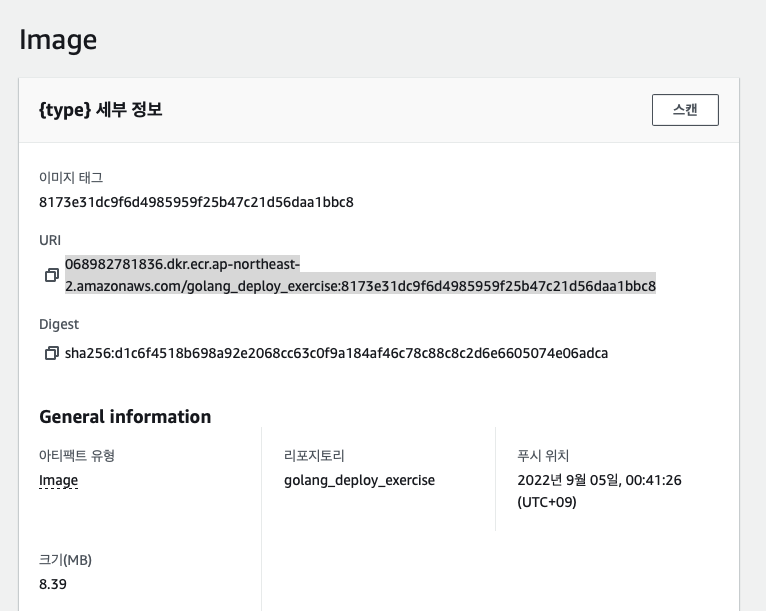 컨테이너 크기도 8.39MB로 매우 tiny한 것을 볼 수 있다.
컨테이너의 URI:8080/sum으로 request를 보내면 모든게 잘 될 것 같지만 처음에 private repo로 만들어서 request를 보낼 수 없다. public으로 진행한다면 문제없이 작동할 것이다.
컨테이너 크기도 8.39MB로 매우 tiny한 것을 볼 수 있다.
컨테이너의 URI:8080/sum으로 request를 보내면 모든게 잘 될 것 같지만 처음에 private repo로 만들어서 request를 보낼 수 없다. public으로 진행한다면 문제없이 작동할 것이다.
private repo에 request를 보내기 위해선 추가 작업이 필요하다. aws-cli로 ecr에 로그인하여 접근할 수 있게 설정한후 로컬에 ECR이미지를 pull 하여 거기에 요청을 보내면 된다.
https://aws.amazon.com/ko/cli/ aws-cli 설치는 pip로 진행한다.
pip install awscli
우선 AWS IAM에서 사용자 > github-ci-deploy > 보안 자격 증명에서 엑세스 키를 새로 만든다.
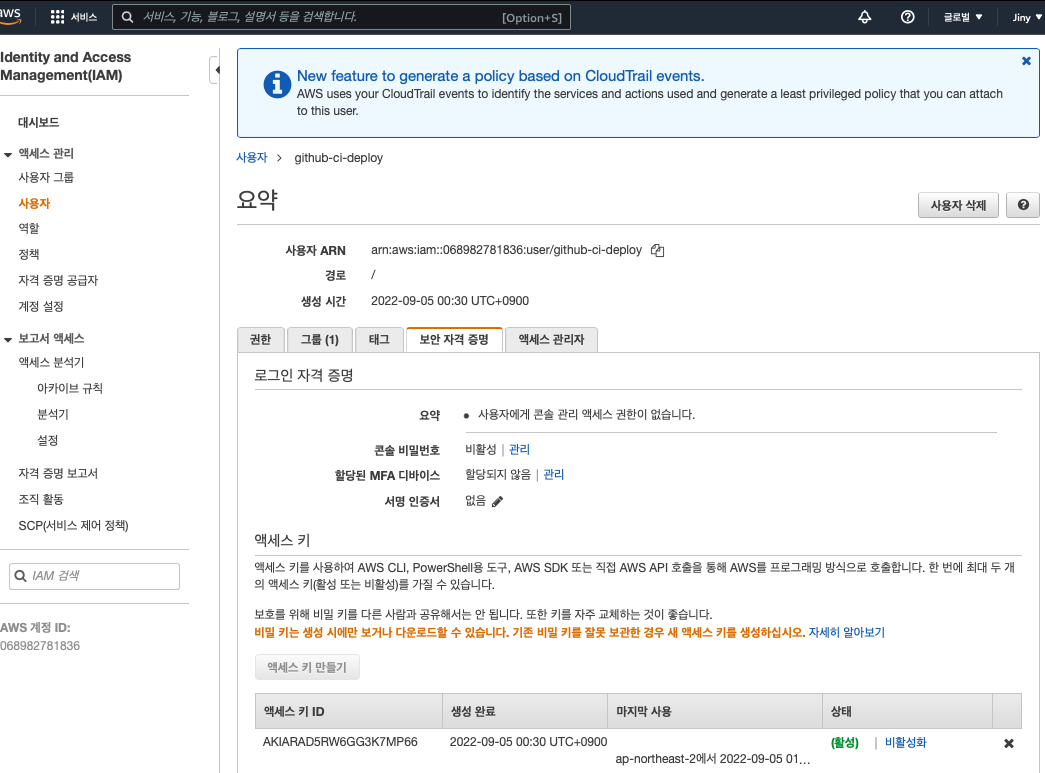
만들어진 access key와 secret key를 aws configure에 입력해준다
aws configure
default region은 서울에 해당하는 리전으로,
output format은 json으로 해준다.

aws ecr get-login-password --region ap-northeast-2 | docker login --username AWS --password-stdin [ECR URI]
ECR URI를 입력할 때 region.amazonaws.com/ 이런식으로 되어 있다.
068982781836.dkr.ecr.ap-northeast-2.amazonaws.com/golang_deploy_exercise:ab7541f0cff207317c60bbac996ceb692902a485
amazonaws.com 뒤에는 필요 없으니 지워주면 된다.
068982781836.dkr.ecr.ap-northeast-2.amazonaws.com
정상 작동하면 Login Successded 메시지를 볼 수 있고 ECR 이미지를 받아올 수 있다.
docker pull [ECR URI]
docker run -p 8080:8080 [ECR URI]
localhost:8080/sum 으로 POST 요청을 보내면 정상적으로 응답한다.

여기까지 action으로 테스트/배포 자동화와 ECR 연동방법을 알아보았다.
